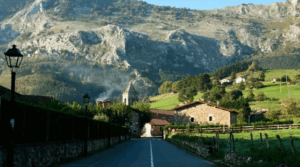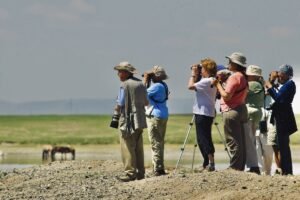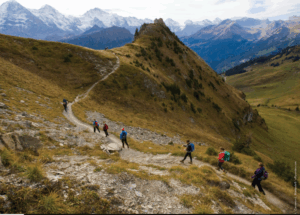The Future of Travel
– Justin Francis
Every day at responsibletravel.com, we talk to tourists and people within the tourism industry who are passionate about travel. They recognise the benefits that responsible tourism can bring to destinations, in terms of employment and the preservation of cultural and natural heritage. At the same time, however, we’re all acutely aware of the growing contribution that aviation makes to global warming.
Consequently, we face a dilemma. How can we align a desire to visit other cultures in a thoughtful way alongside a conscience that calls for the reduction in our everyday carbon emissions? It’s this dilemma that inspired us to start a debate around the future of tourism. If we’re serious about pursuing a sustainable future for travel, it’s essential that we have a vision to which we can aspire.
My own experiences within the industry have given me a unique insight into the forces that drive it. This, in turn, has allowed me to formulate a series of ideas about the changes we can expect to see taking place over the next 20 or so years.
Travel with a purpose
The rise of the package holiday and ‘bucket and spade’ culture during the past half century led us to believe that travel was about jetting off for two weeks of sun, sand and souvenirs. And more recently, the advent of low-cost airlines has seen tourism become, for many people, a race to tick off trophy experiences and destinations. We collect the passport stamps and the digital photos, and then move on to the next ‘unmissable’ sight.
If I walked into a high street travel agent today, the first question I would be asked is ‘Where do you want to go?’ I’ve always thought that this was the wrong question: it isn’t the ‘where’ that’s important, it’s the ‘why’ and the ‘how’. I want to go on holiday to re-charge my batteries or to reconnect with myself. Sometimes I want to meet new people or to discover and learn about another place and another culture. When deciding what my next holiday will be, I try to place the focus more on what I need from the holiday and what I can give back to destinations and local people.
As the cost of flying increases (whether it’s due to increases in the cost of aviation fuel, tax rises or the imposition of emissions trading) and ‘carbon guilt’ sets in – meaning we no longer feel entirely comfortable boasting about our overseas holidays – the ‘why’ and ‘how’ of travel will surely become more important. When we travel in the future, it will be with more of a purpose, with not only our own needs in mind, but also those of the destination.
This new way of travelling could be described as ‘deep’ travel. It will be about getting under the skin of a place. We already seek out authenticity – real experiences rather than fake culture packaged up for tourists – but travel in 2020 will go further. It will be about the appreciation of local distinctiveness, the idiosyncrasies and the detail, the things that make a place unique and special. It will be as much about the smell of fresh spices in Kerala in India and the colourful tailors of Hoi An in Vietnam as it is about rediscovering the exotic and locally distinctive closer to home – be it bluebells in an English wood or the taste of Wensleydale cheese.
Keeping it local
As the cost of flying increases, we’ll see the end of the truly low-cost airline. Consequently, the ‘local’ approach will become central to travel – not only as a new mindset in the quest for local distinctiveness but also as a factor affecting our choice in destinations. To coin a new term, travel in 2020 will be ‘geo-local’. In other words, holidaymakers will travel much closer to home. We’ll begin to travel more within our own countries and continents, and less frequently beyond them. A British family might head to Cornwall to stay in a locally run Cornish cottage, shop for Cornish crafts and enjoy a cream tea. Holidaymakers will increasingly discover that the exoticness of the unknown doesn’t have to take the form of a desert island in the middle of the Pacific.
Tourism will no longer be dominated by Westerners either. We’ll see residents of India and China becoming more mobile than ever before from a leisure perspective. Already, hotels in India and China that once hosted Western visitors almost exclusively are beginning to see proportion of domestic guests rise, in some cases overtaking the number of foreigners.
By 2020, we’ll also see the majority of hotels getting their produce, employees, materials, services and the like from sources within their immediate vicinity. I refer to this as ‘hyper-local’ sourcing. We’ll see a new type of hotel – ‘the ten-kilometre hotel’ – for which all food and materials will have been sourced from within a ten-kilometre radius. In addition, these hotels will provide energy and water for guests on a metered system, and separate charges for each will appear on their bill. Discounts will be offered for those visitors who keep their energy and water use below average.
Alternative transport
Driven by the increased cost of flying, travel will begin to develop parallels with the slow-food movement. We’ll gradually see an appreciation of ‘slow travel’, with journeys made by train, boat and bike gaining in popularity. People will gain a greater appreciation for the journey itself, as opposed to the restless striving for the next destination.
This change in mindset will be coupled with improvements in other forms of transport, making the whole experience more enjoyable. I hope that we’ll see carbon caps set for every airline and that an investment in rail travel – and a consequent reduction in cost – will be one of the direct beneficiaries of carbon trading. Planning rail travel will also be easier as timetables are designed to link up fast trains between countries and one global website is created through which to book them all.
In the same way that travellers now choose tour companies and hotels based on their responsible-tourism credentials, new websites will allow you to choose flights from the lowest-carbon airline for your particular journey. Although there is a widespread belief within the industry that there isn’t any alternative to kerosene aviation fuel, I think we will see airlines increasingly making use of environmentally friendly biofuels.
And we’re sure to see the implementation of new ideas, such as adding giant sails to cruise ships to reduce their enormous carbon footprint, and the return to old ideas such as using airships for shorter journeys.
Destinations: changing climates and future planning
Climate change is already having a profound impact on tourism and will soon start to change which destinations we feel comfortable about visiting and when. The traditional holiday migration of Northern Europeans to Southern Europe during July and August will be threatened by temperatures that are too hot for many tourists.
Many destinations will also be forced to change their focus. Many lower Alpine ski resorts are already having to either close or place the emphasis more on summer walking holidays. Coral bleaching, coastal erosion and a rise in sea level will threaten many traditional diving and beach destinations. Extreme weather events are also likely to become more frequent, reducing the tourist season in many destinations, such as those in the Caribbean.
The consequences of global warming, including crop failures and changes in water availability, will lead to mass migration and increased social and political instability – threatening tourism in some of the countries that are most dependent upon it.
Given the reality of climate change, destinations need to actively plan ahead to ensure that they attract the right kind of visitors to the right areas of their country in a way that maximises sustainability. For too long, tourism ministers have single-mindedly pursued increased tourist numbers without fully understanding either the local economic benefits of different types of tourists or the true cost of tourism to local cultures and the environment.
Smart destinations will no longer just pursue more tourists per se. Instead, they will focus more on the types of tourists they need and matching these to the most suitable areas and communities within their country. As a result, economic benefits will be maximised, while social and environmental costs are kept to a minimum.
We’ll also see a change in the way that destinations are presented and marketed to travellers. There will be further growth in consumer-led, online peer-to-peer travel advice and this will spark a ‘democratisation’ of travel. By this I mean that travellers and locals alike will gradually be more empowered to speak on behalf of a diversity of new and interesting places. Everyone will begin to have a say in the destinations of the future, threatening the current monopoly of the ‘mega-icons’ and ‘must-see’ sights, whether it be the Inca Trail, Kilimanjaro or the Taj Mahal.
The repercussions on destinations will be vast. Negative impacts such as overcrowding will be reduced and the benefits of tourism spread more broadly.
Holiday labelling
Over the past few decades, we’ve seen the food industry introduce an array of labels: fair trade, organic, locally produced and increasingly, ‘carbon ratings’. I think we’ll eventually see a similar scheme being applied to holidays, although I don’t think that the labelling will be limited to the carbon content. Although it would be fiendishly difficult to implement, a truly holistic approach to responsible tourism would include a rating for the holiday’s impact on local communities and cultures, as well as on the local environment.
In search of Utopia
I’m optimistic that in the future, travel and tourism will be both sustainable and responsible, with a focus on preserving identities and cultures, celebrating the unique and conserving what is locally distinctive about a place. We’ll fly less and, in turn, we’ll fall back in love with travel closer to home.
I think we will begin to have a more personal, meaningful relationship with the places that we visit and a better understanding of our individual motivations for travelling. When we contact a travel agent, they’ll be asking us, ‘What do you need from a holiday?’ rather than, ‘Where do you want to go?’
This vision, explored above and within this special edition of Geographical, is just that – a utopian vision, a collection of ideas on which a sustainable future might be built. We hope it will spark other ideas: creative, innovative and inspiring ambitions. Above all, I hope it creates debate. After all, if we can’t begin to work towards a more responsible future for travel, there may well not be a travel industry at all. -thefutureoftourism.com














